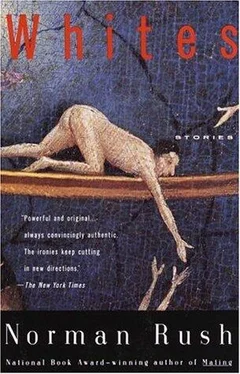He handled the carvings dutifully and then gave them back to her. He murmured that they were interesting.
He took more tea. She stood the tokoloshi on an end table halfway across the room, facing them. He began contemplating them, sipping his tea minutely. Time was passing. She had various mottoes she used on herself. One was, Inside every suit and tie is a naked man trying to get out. She knew they were stupid, but they helped. He was still in the grip of whatever was bothering him.
“I have something that might interest you,” she said. She went to the cabinet again and returned with a jackal-fur wallet, which she set down on the coffee table in front of him. “This is a fortune-telling kit the witch doctors use. It has odd things inside it.” He merely looked at it.
“Look inside it,” she said.
He picked it up reluctantly and held it in his hand, making a face. He was thinking it was unsanitary. She was in danger of becoming impatient. The wallet actually was slightly fetid, but so what: it was an organic thing. It was old.
She reached over and guided him to open and empty the wallet, touching his hands. He studied the array of bones and pebbles on the tabletop. Some of the pebbles were painted or stained. The bones were knucklebones, probably opossum, she told him, after he showed no interest in trying to guess what they were. She had made it her business to learn a fair amount about Tswana divination practices, but he wasn’t asking. He moved the objects around listlessly.
She lit a candle, though she felt it was technically premature. It would give him something else to stare at if he wanted to, and at least he would be staring in her direction, more or less.
The next segment was going to be taxing. The pace needed to be meditative. She was fighting impatience.
She said, “Africa is so strange. You haven’t been here long, but you’ll see. We come here as … bearers of science, the scientific attitude. Even the dependents do, always telling the help about nutrition and weaning and that kind of thing.
“Science so much defines us. One wants to be scientific, or at least not un scientific. Science is our religion, in a way. Or at least you begin to feel it is. I’ve been here nineteen months …”
He said something. Was she losing her hearing or was the man just unable to project? He had said something about noticing that the tokoloshi weren’t carrying hypodermic needles. He was making the point, she guessed, that the Batswana didn’t reject Western medicine. He said something further about their attachment to injections, how they felt you weren’t actually treating them unless they could have an injection, how they seemed to love injections. She would have to adapt to a certain lag in this man’s responses. I am tiring, she thought.
She tried again, edging her chair closer to his. “Of course, your world is different. You’re more insulated at the Ministry, where everyone is a scientist of sorts. You’re immersed in science. That world is … safer. Are you following me?”
He said that he wasn’t sure that he was.
“What I guess I mean is that one gets to want to really uphold science. Because the culture here is so much the opposite. So relentlessly so. You resist. But then the first thing you know, very peculiar things start happening to you. Or you talk to some of the old-settler types, whites, educated people from the Protectorate days who decided to stay on as citizens, before the government made that such an obstacle course. The white settlers are worse than your everyday Batswana. They accept everything supernatural, almost. At first you dismiss it as a pose.”
She knew it was strictly pro forma, but she offered him cigarettes from the caddy. He declined. There was no way she could smoke, then. Nothing tonight was going to be easy. Bechamel was right next door to the name she was trying to remember: Why couldn’t she get it?
“But it isn’t a pose,” she said. “Their experiences have changed them utterly. There is so much witchcraft. It’s called muti . It’s so routine. It wasn’t so long ago that if you were going to open a business you’d go to the witch doctor for good luck rites with human body parts as ingredients. A little something to tuck under the cornerstone of your bottle store. People are still being killed for their parts. It might be a windpipe or whatever. It’s still going on. Sometimes they dump the body onto the railroad tracks after they’ve taken what they need, for the train to grind up and disguise. Recently they caught somebody that way. The killers threw this body on the track but the train was late. They try to keep it out of the paper, I know that for a fact. But it’s still happening. An undertow.”
She worked her feet out of her sandals. Normally she would do one and let an intriguing gap fall before doing the other. She scratched an instep on an ankle.
She said, “I know a girl who’s teaching in the government secondary in Bobonong who tells me what a hard time the matron is having getting the girls to sleep with their heads out of the covers. It seems they’re afraid of bad women who roam around at night, who’ll scratch their faces. These are women called baloi , who go around naked, wearing only a little belt made out of human neckbones. Naturally, anyone would say what a fantasy this is. Childish.
“But I really did once see a naked woman dodging around near some rondavels late one night, out near Mosimane. It was only a glimpse. No doubt it was innocent. But she did have something white and shimmering around her waist. We were driving past. You begin to wonder.”
She waited. He was silent.
“Something’s bothering you,” she said.
He denied it.
She said, “At any rate, don’t you think it’s interesting that there are no women members of the so-called traditional doctors’ association? I know a member, what an oaf! I think it’s a smoke-screen association. They want you to think they’re just a benign bunch of herbalists trying out one thing or another, a lot of which ought to be in the regular pharmacopeia if only white medical people weren’t so narrow-minded. They come to seminars all jolly and humble. But if you talk to the Batswana, you know that it’s the women, the witches, who are the really potent ones.”
Still he was silent.
“Something’s happened, hasn’t it? To upset you. If it’s anything I’ve said, please tell me.” A maternal tone could be death. She was flirting with failure.
He denied that she was responsible in any way. It seemed sincere. He was going inward again, right before her eyes. She had a code name for failures. She called them case studies. Her attitude was that every failure could be made to yield something of value for the future. And it was true. Some of her best material, anecdotes, references to things, aphrodisiana of all kinds, had come from case studies. The cave paintings at Gargas, in Spain, of mutilated hands … hand prints, not paintings … stencils of hundreds of hands with joints and fingers missing. Archaeologists were totally at odds as to what all that meant. One case study had yielded the story of fat women in Durban buying tainted meat from butchers so as to contract tapeworms for weight loss purposes. As a case study, if it came to that, tonight looked unpromising. But you could never tell. She had an image for case studies: a grave robber, weary, exhausted, reaching down into some charnel mass and pulling up a lovely ancient sword somehow miraculously still keen that had been overlooked. She could name case studies that were more precious to her than bingoes she could describe.
She had one quiver left. She meant arrow. She hated using it.
She could oppose her silence to his until he broke. It was difficult to get right. It ran counter to being a host, being a woman, and to her own nature. The silence had to be special, not wounded, receptive, with a spine to it, maternal, in fact.
Читать дальше












